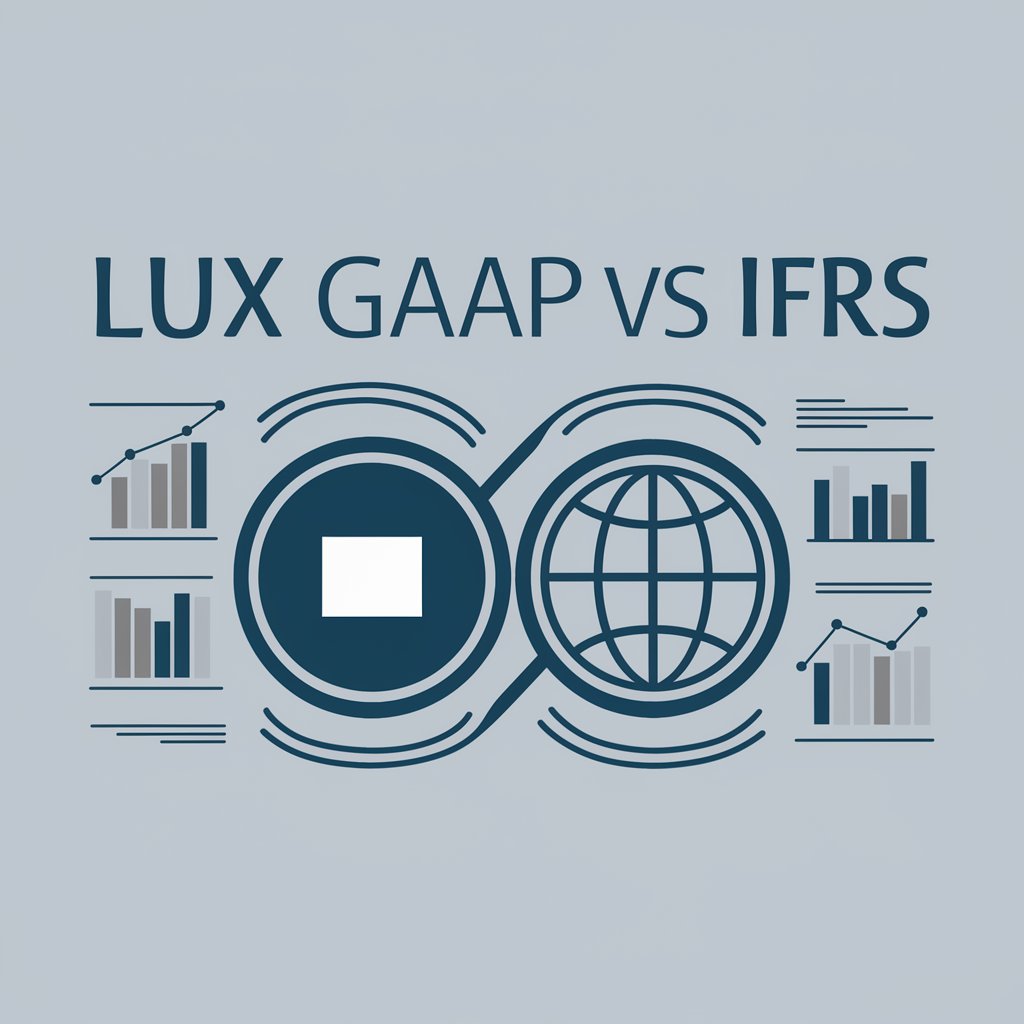
Lux GAAP vs IFRS - Lux GAAP vs IFRS Comparison Tool

Hello! Let's compare Lux GAAP and IFRS accounting standards.
Navigate financial reporting with AI-powered Lux GAAP vs IFRS insights.
Describe the main differences between Lux GAAP and IFRS regarding revenue recognition.
What are the key variations in lease accounting between Lux GAAP and IFRS?
How does Lux GAAP handle financial instruments compared to IFRS?
Can you compare the treatment of intangible assets under Lux GAAP and IFRS?
Get Embed Code
Introduction to Lux GAAP vs IFRS
Lux GAAP and IFRS are both frameworks for financial reporting but serve different purposes and stem from different legal and cultural foundations. Lux GAAP is primarily used within Luxembourg, tailored to local laws and needs, and mandatory for most companies. In contrast, IFRS is used globally, designed to standardize reports for investors and public use across different nations. For example, Lux GAAP allows more flexibility in certain valuations, like using historical cost or revaluation models for property, while IFRS tends to emphasize fair value measurement, increasing transparency but also complexity. Powered by ChatGPT-4o。

Main Functions of Lux GAAP vs IFRS
Fair Value Measurement
Example
IFRS 13 under IFRS provides extensive guidance on how to measure the fair value of various assets and liabilities, mandatory in many contexts such as financial instruments and investment properties. Lux GAAP, however, has more limited provisions, focusing mainly on financial instruments and certain other assets only if IFRS permits.
Scenario
In a scenario where a company has extensive investments in financial instruments, under IFRS, it would report these at fair value, potentially showing significant volatility in earnings. Under Lux GAAP, the same instruments might be reported at historical cost, leading to more stable but less market-reflective earnings.
Income Recognition
Example
Under IFRS, revenue from contracts with customers (IFRS 15) is recognized based on the satisfaction of performance obligations, which can be complex and require significant judgment. Lux GAAP generally adheres to a simpler approach, recognizing revenue when it is realized or realizable and earned.
Scenario
Consider a software company with multi-element contracts that include licenses, updates, and support. Under IFRS, revenue recognition might be spread over different periods based on performance obligations, while under Lux GAAP, it might be recognized more upfront or upon delivery.
Ideal Users of Lux GAAP vs IFRS
Local vs. Global Companies
Local companies in Luxembourg typically use Lux GAAP for compliance with local regulations and simplicity, beneficial for entities without international financing needs. Global companies, especially those listed on international stock exchanges or with foreign investors, use IFRS for its wider acceptance and facilitation of cross-border investment and comparison.
Industries Requiring Specific Financial Treatments
Companies in industries with specific financial reporting requirements, like banking or insurance, might prefer IFRS due to its detailed guidelines on financial instruments and insurance contracts. Lux GAAP is more suitable for industries where such specific international requirements are less critical.

Guidelines for Using Lux GAAP vs IFRS
Initiate Your Journey
Start by visiting yeschat.ai to explore a free trial offering comprehensive insights into Lux GAAP vs IFRS, without the need for signing up or subscribing to ChatGPT Plus.
Understand Your Needs
Identify whether your financial reporting requirements are more aligned with Lux GAAP or IFRS by evaluating your entity’s size, industry, and geographical presence, as well as investor expectations.
Consult the Documentation
Refer to the comprehensive comparison between Lux GAAP and IFRS provided in the documentation to understand the key differences and similarities that may impact your financial statements.
Evaluate Implementation Impact
Assess the impact of adopting either framework on your financial reporting processes, including the need for changes in IT systems, training for finance staff, and potential tax implications.
Seek Professional Advice
Consider consulting with accounting professionals or advisors specialized in Lux GAAP and IFRS to make an informed decision and ensure compliance with the chosen accounting framework.
Try other advanced and practical GPTs
IEP ASSISTANT OFFICAL ✔️
Empowering IEP Development with AI

Landlord's Locker
Empowering Landlords with AI

Looper
Explore Topics with AI-Driven Depth

Airflow Cooker
Empowering your Airflow development with AI

Tonda Booker Real Estate
Empowering Real Estate Decisions with AI

Tonda Booker RE Team
Empowering real estate decisions with AI

Canadian Accountant GPT (CPA, ASPE, IFRS)
Empowering Accounting Decisions with AI

Commercialista Italiano
Your AI-powered guide to Italian business.
API Schema Wizard 🧙🏼
Automate API schema creation effortlessly

Scholarly Insight Reviewer
Empowering your research with AI

Swagger creator
Streamline API documentation with AI

Poker Strategy Ace
Strategize Smarter with AI-Powered Poker Advice

Q&A on Lux GAAP vs IFRS
What are the major differences between Lux GAAP and IFRS?
Major differences include the recognition and measurement of financial instruments, property, plant, and equipment, and the treatment of leases. IFRS tends to be more comprehensive and detailed in its guidance compared to Lux GAAP.
Can Lux GAAP entities opt to measure financial instruments at fair value?
Yes, entities reporting under Lux GAAP have the option to measure financial instruments at fair value, similar to IFRS, but must disclose significant assumptions and the impact on financial statements.
How does IFRS 13 Fair Value Measurement compare to Lux GAAP?
IFRS 13 provides a detailed fair value measurement framework, emphasizing a market participant's perspective and a fair value hierarchy. Lux GAAP allows for fair value measurement but with less prescriptive guidance.
What is the approach to property, plant, and equipment under both frameworks?
Both Lux GAAP and IFRS recognize property, plant, and equipment as tangible assets expected to be used for more than one period, but IFRS provides more detailed guidance on measurement, depreciation, and impairment.
Are there any specific disclosures required for fair value measurements under Lux GAAP?
Yes, for financial instruments measured at fair value, Lux GAAP requires disclosures about valuation techniques, assumptions, and the impact of fair value measurements on financial statements.





